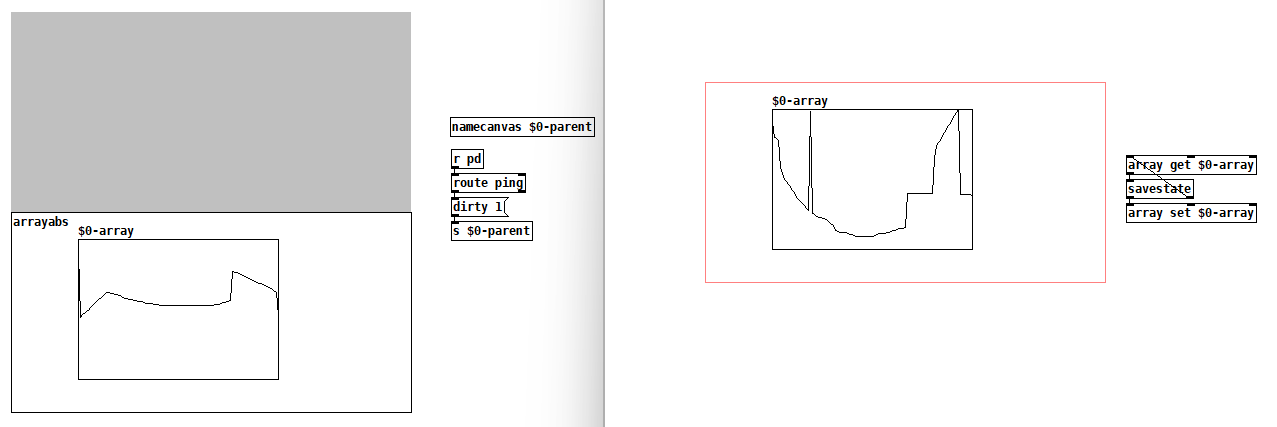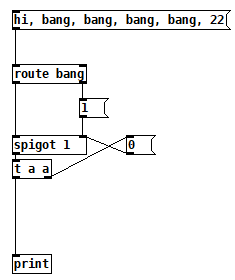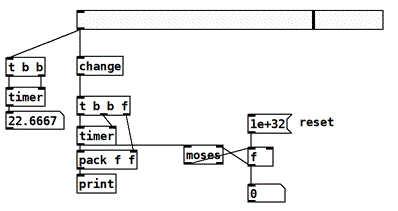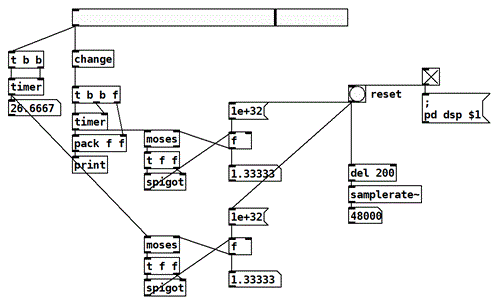-
-
 lacuna
posted in technical issues • read more
lacuna
posted in technical issues • read moreinlet~ helpfile

Connect [f $1] to [inlet~].
Or use [sig~ $1] ? Not sure what you want to do? -
 lacuna
posted in technical issues • read more
lacuna
posted in technical issues • read more
Try to undestand the patch and read the manual, esp. 2 control.examples / 08.depthfirst.pd -
 lacuna
posted in technical issues • read more
lacuna
posted in technical issues • read moreVanilla's Changelog (don't know if this is complete):
https://msp.ucsd.edu/Pd_documentation/resources/chapter5.htmYou probably used Pd-Extended 15 years ago!?
Extended is discontinued, but you can add libraries to Vanilla.
There is 'Deken' now: Pd-menu > help > find externals online .
There is also this website of Deken, which helps to find missing objects: deken.puredata.info
So [init] is part of IEMlib.
But is also easily replaceble as Vanilla abstraction:[loadbang]
|
[args 0(
|
[pdcontrol]
|
[list trim] [inlet]
|/
[outlet]pdcontrol did not exist 15 years ago.
All Vanilla objects: help > list of all objectsAnd there is the compatibility message to revert Vanilla to an old version:
[;pd compatibility 0.52(see message-helpfile > pd-messages
There have been many many improvements to Pd, intelligent patching for example.
And documentation also improved a lot!It has been a big shift when Pd went from 32 to 64 bit. In this transition some libraries have not been updated and I think it has been that time where Extended discontinued. You can still download it and run your old patches there ...
EDIT: more on finding externals or abstractions:
https://forum.pdpatchrepo.info/topic/15770/harmonic-amplification/4 -
 lacuna
posted in technical issues • read more
lacuna
posted in technical issues • read more@jamcultur I can reproduce this. Feels like a bug but I think it is the nature of abstractions saving confilicting with the array saving.
As workaround we can do our own array saving with [savestate]

arrayabs.pd
arrayabsopenthis.pd -
 lacuna
posted in technical issues • read more
lacuna
posted in technical issues • read more@Balwyn said:
anything else opens the spigot
would be this:

in your patch only floats open the spigot
-
 lacuna
posted in technical issues • read more
lacuna
posted in technical issues • read moreMaybe the answer is in this video of Millers classes at 1:04:00
https://msp.ucsd.edu/syllabi/206.20s/movies/5b.may1.mp4
sorting starts at 59:19:15
overview: https://msp.ucsd.edu/syllabi/206.20s/index.htm -
 lacuna
posted in technical issues • read more
lacuna
posted in technical issues • read more
A comma in a message means "now comes another message"
so [1, 2(
is the same as
[t b b]
| |
[2( [1(So you could separate your two messages to subpatch with a comma instead of writing ;subpatch again. (where the semicolon means "send to")
-
 lacuna
posted in technical issues • read more
lacuna
posted in technical issues • read more@jameslo And when filtering zero, there are different timings at different samplerates and dsp on/off also differs.
At 48kHz samplerate and dsp off, lowest is 4 ms but very very rarely goes as low as 2.66667 ms. -
 lacuna
posted in technical issues • read more
lacuna
posted in technical issues • read more@jameslo wtf I expected 64 samples. It can go down to zero:
slider-min-update-rate.pd

Is this related related? [Pd-list] pd-gui update rate (2011)
https://lists.iem.at/hyperkitty/list/pd-list@lists.iem.at/thread/NFL5EIGEJQII7G5X5FXGM2WXDM6W4263/#KJSQGTRBJVBZGMQPHFYRGYBQXN7GSOZL

